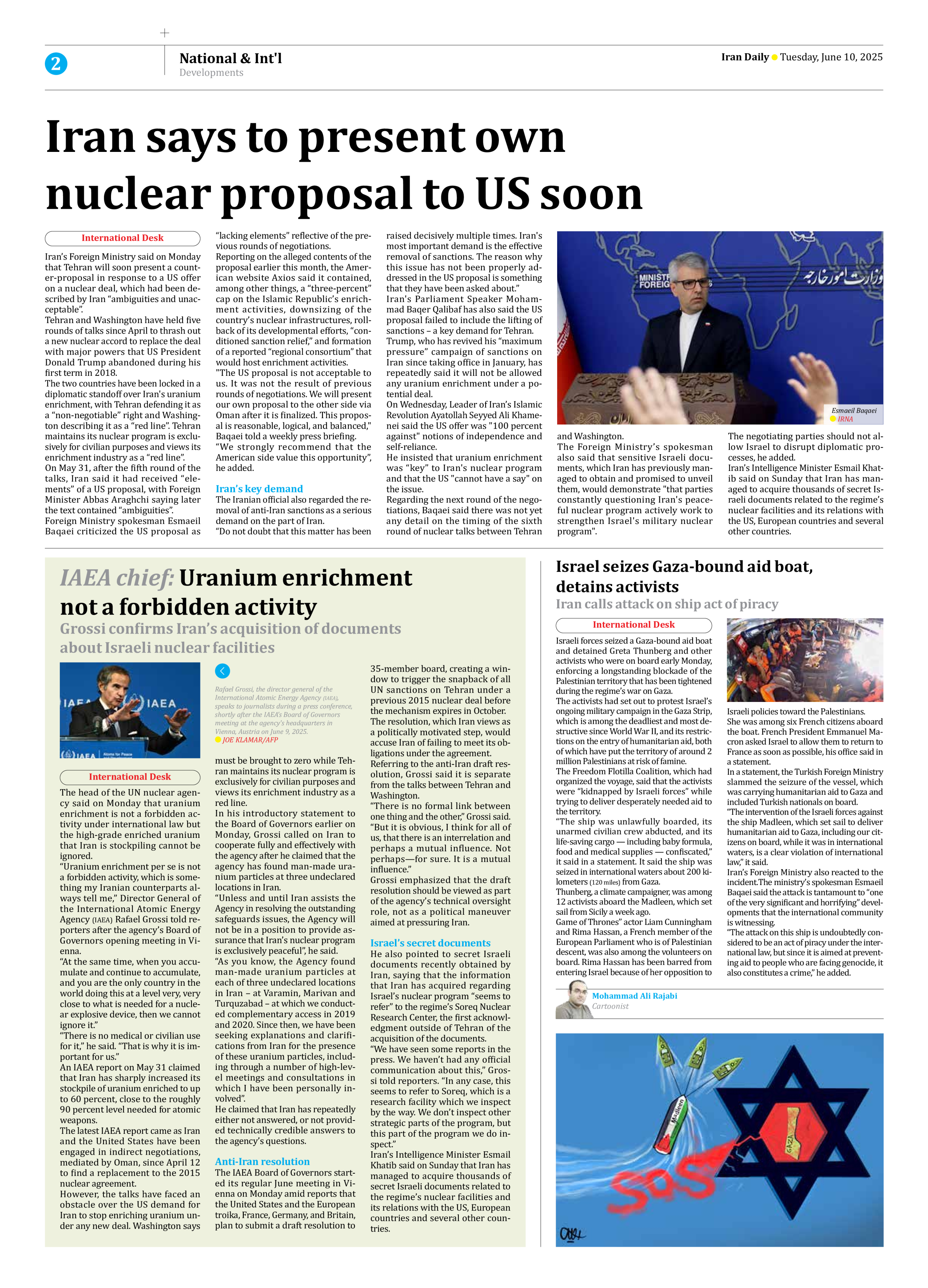
Iran says to present own nuclear proposal to US soon
Iran’s Foreign Ministry said on Monday that Tehran will soon present a counter-proposal in response to a US offer on a nuclear deal, which had been described by Iran “ambiguities and unacceptable”.
Tehran and Washington have held five rounds of talks since April to thrash out a new nuclear accord to replace the deal with major powers that US President Donald Trump abandoned during his first term in 2018.
The two countries have been locked in a diplomatic standoff over Iran's uranium enrichment, with Tehran defending it as a “non-negotiable” right and Washington describing it as a “red line”. Tehran maintains its nuclear program is exclusively for civilian purposes and views its enrichment industry as a “red line”.
On May 31, after the fifth round of the talks, Iran said it had received “elements” of a US proposal, with Foreign Minister Abbas Araghchi saying later the text contained “ambiguities”.
Foreign Ministry spokesman Esmaeil Baqaei criticized the US proposal as “lacking elements” reflective of the previous rounds of negotiations.
Reporting on the alleged contents of the proposal earlier this month, the American website Axios said it contained, among other things, a “three-percent” cap on the Islamic Republic’s enrichment activities, downsizing of the country’s nuclear infrastructures, rollback of its developmental efforts, “conditioned sanction relief,” and formation of a reported “regional consortium” that would host enrichment activities.
"The US proposal is not acceptable to us. It was not the result of previous rounds of negotiations. We will present our own proposal to the other side via Oman after it is finalized. This proposal is reasonable, logical, and balanced," Baqaei told a weekly press briefing.
“We strongly recommend that the American side value this opportunity”, he added.
Iran’s key demand
The Iranian official also regarded the removal of anti-Iran sanctions as a serious demand on the part of Iran.
“Do not doubt that this matter has been raised decisively multiple times. Iran's most important demand is the effective removal of sanctions. The reason why this issue has not been properly addressed in the US proposal is something that they have been asked about.”
Iran's Parliament Speaker Mohammad Baqer Qalibaf has also said the US proposal failed to include the lifting of sanctions – a key demand for Tehran.
Trump, who has revived his “maximum pressure” campaign of sanctions on Iran since taking office in January, has repeatedly said it will not be allowed any uranium enrichment under a potential deal.
On Wednesday, Leader of Iran’s Islamic Revolution Ayatollah Seyyed Ali Khamenei said the US offer was "100 percent against" notions of independence and self-reliance.
He insisted that uranium enrichment was “key” to Iran's nuclear program and that the US "cannot have a say" on the issue.
Regarding the next round of the negotiations, Baqaei said there was not yet any detail on the timing of the sixth round of nuclear talks between Tehran and Washington.
The Foreign Ministry’s spokesman also said that sensitive Israeli documents, which Iran has previously managed to obtain and promised to unveil them, would demonstrate "that parties constantly questioning Iran's peaceful nuclear program actively work to strengthen Israel's military nuclear program".
The negotiating parties should not allow Israel to disrupt diplomatic processes, he added.
Iran’s Intelligence Minister Esmail Khatib said on Sunday that Iran has managed to acquire thousands of secret Israeli documents related to the regime’s nuclear facilities and its relations with the US, European countries and several other countries.







